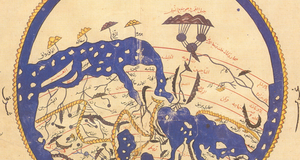America's Misguided 'War on Terror:' Contrasting Samuel Huntington's Clash of Civilizations with Ibn Khaldun's Theory of Social Solidarity
By
2013, Vol. 5 No. 09 | pg. 1/2 | »
IN THIS ARTICLE
KEYWORDS
Islam has been under siege since 2001 and in today's political environment, Muslims are too often associated with terrorism. The heinous attacks of 9/11 were treated by the U.S. not as crimes – which would require criminal prosecution and law enforcement – but as a statement of war against Americans, freedom, democracy, and “the Western way of life” (Hossein-zadeh 2006: 91). From this standpoint, and viewing acts of terrorism as acts of war, a military response seemed appropriate. So far, however, the global war on terror has done little to eradicate terrorism. On the contrary, it seems the threat of an attack is now bigger: the number of terrorist attacks worldwide increased from under two-thousand in 2001, to a staggering five-thousand ten years later (START 2012). This paper argues that the violently ineffective Western approach to terrorism springs from and exacerbates widespread beliefs that the current world order consists of ‘civilizations’ between which there are monumental, insurmountable differences. Moreover, it is argued that this belief is incorrect; that states, not civilizations, are the constituent components of world order; that the Arab world is therefore not a homogenous bloc or ‘civilization;’ and that recognition of this fact will go a long way in finding a more peaceful and effective solution to terrorism. This essay is divided into two sections. The first discusses the theory that has been most influential in the debate on post-9/11 Eastern-Western relations by outlining of Samuel Huntington’s ‘clash of civilizations’ argument. It is argued that its simplistic and deterministic ‘Us versus Them’ rhetoric has led to an incorrect assessment by the West, and the U.S. in particular, about the causes of terrorism; consequently, this assumption has played an important role in justifying a global war that will do little to eradicate Islamic fundamentalism. In the second section, the focus falls on Islamic classical author Ibn Khaldun, whose theory of the rise and fall of states based on solidarity provides a good starting point for a more nuanced assessment of the Arab world today. Particular attention is paid to the importance of leadership and identity, which is emphasized by both Huntington and Khaldun, but in considerably different ways. The 'Clash of Civilizations' as a Foundation for Ineffective Foreign PolicyThe events of September 2001 gave ample ammunition to defenders of the clash of civilizations theory. The attacks brought questions to the fore about how Al Qaeda’s radical violence should be understood “in relation to wider, diverse Islamic thought” (Coll 2012). Islam, and the Arab world which in public discourse has become synonymous with the religion, have increasingly been characterized as backward and fundamentalist and placed in stark contrast with the West, which is “the best” and whose model “[all other civilizations] aspire to” (Piel 1993: 55).In his essay first published in 1993, Huntington predicts that “the most important conflicts of the future will occur along the cultural fault lines separating [seven or eight major] civilizations from one another” (Huntington 1993: 3). This is because while globalization is making the world a smaller place and interactions between peoples of different civilizations are increasing, the “fundamental” differences among civilizations that are “the product of centuries” are not likely to disappear soon (Huntington 1993: 4). He also argued that, perhaps because the West is at a peak of power, non-Western civilizations are returning to their roots; in the Middle East, a return to cultural roots takes the form of “re-Islamization” (Huntington 1993: 5). As people define their identity in ethnic and religious terms, they become more solidary and homogenous and are likely to see an “us versus them relation existing between themselves and people of different ethnicity or religion” (Huntington 1993: 7). He believes that the Arab world, where “Western democracy strengthens anti-Western political forces” will make the strongest return to religion (Huntington 1993: 10). Most major conflicts are therefore likely to be fought between Muslims and non-Muslims. In short, he states, “Islam has bloody borders” (Huntington 1993: 12). Huntington’s thesis undoubtedly gained support after 9/11, but it has been influential since it was first published. In fact, it is argued that such notions as the clash of civilizations theory have diverted attention from the real causes of terrorism and have so been instrumental in shaping U.S. perception of and foreign policy on Islamic fundamentalism. Religious fundamentalism is universal: it arises in response to modernity and secularism, both of which tend to weaken or threaten religious traditions. John Voll points out that by the early 1990s, “violent militancy was clearly manifest among Hindu fundamentalists, Buddhists in Sri Lanka, Jewish fundamentalists in Israel and others elsewhere” (1994, cited in Hossein-zadeh 2006: 110-11). As one scholar points out, if the Bosnians, the Palestinians and the Kashmiris are asked about their borders they would say that, respectively, Christianity, Judaism and Hinduism are the ones that have bloody borders (Ahmed 2002: 29). Huntington seems to have at least a basic awareness of this as he does not deny the role of modernization in the resurgence of religion, nor does he deny that peoples everywhere are holding on to their roots more fiercely; yet he does single out Islam as the most dangerous potential enemy of the West. By supposing that their return to religious roots shall have bloodier consequences than elsewhere, he is implying that Islam is inherently more rigid, static and anti-modern than other religions. He interprets the militancy of Islamic fundamentalism as being somehow directly caused by distinctive Islamic doctrines and traditions (Voll 1994, cited in Hossein-zadeh 2006: 111). This analysis seems to be based on little more than deep-rooted historical prejudices, and the impact of his essay allowed these to resurface in the social and political spheres (Ahmed 2002: 28). Huntington is not alone in distorting the causes and realities of Islamic fundamentalism. In 1990, historian Bernard Lewis describes a “surge of hatred” rising from the Islamic world that “becomes a rejection of Western civilization as such” (cited in Coll 2012). Richard Perle, American neoconservative militarist and advisor to Israel’s Likud party, proposes a strategy of “de-contexualization” to explain acts of terrorism and violent resistance to Israeli occupation. He argues that we must stop trying to understand the territorial, geopolitical and historical reasons that some groups turn to terrorism; instead, reasons for the violence of such groups must be sought in the Islamic way of thinking (Hossein-zadeh 2006: 101). What Huntington, Lewis and Perle have in common is that they attribute the root causes of Islamic fundamentalism and consequent terrorist attacks to “pathological problems of the Muslim mind” (Hossein-zadeh 2006: 101), some more overtly than others. In doing so, they posit a characteristic, supposedly shared by Muslims from Indonesia through Iran to Senegal, that makes conflict with the West inevitable. With such a view widespread among the American public, it is not surprising that the attacks of 9/11 were treated as a direct and personal attack on Americans. Once the majority is convinced that violence is part of the nature of Islam, pre-emptive war seems to be a logical solution: after all, how will dialogue help if the Muslim mind is pathologically troubled? As Peña points out, however, a larger military would not have prevented the tragedy of 9/11, and it will not prevent future terrorist actions (2001, cited in Snider 2004). Terrorism, much like the war that is fought against it, is a means of pursuing objectives, not an actor. It cannot be stopped by military action as fighting does nothing to address the issues that terrorists feel can only be resolved violently; if anything, this is more likely to lead to a vicious cycle of constantly increasing military operations and an ever higher number of terrorist attacks. As one author put it: “the moral crusade to end terrorism can only begin with a realistic assessment of its cause” (Snider 2004). The clash of civilizations theory has not been the route to that realistic assessment. In fact, the clash of civilizations theory has led to a misunderstanding of the causes of terrorism, which in turn has been instrumental in shaping flawed policies to deal with the problem.Continued on Next Page » Suggested Reading from Inquiries Journal
Inquiries Journal provides undergraduate and graduate students around the world a platform for the wide dissemination of academic work over a range of core disciplines. Representing the work of students from hundreds of institutions around the globe, Inquiries Journal's large database of academic articles is completely free. Learn more | Blog | Submit Latest in Political Science |














